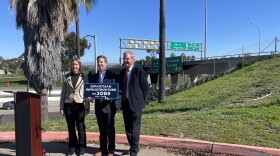RENEE MONTAGNE, host:
And joining us from Chengdu, the capital of Sichuan province, is Melissa Block, who you usually hear on ALL THINGS CONSIDERED. She'll be reporting all this week, leading up to the first anniversary of the earthquake. Good morning.
MELISSA BLOCK: Good morning, Renee.
MONTAGNE: And, Melissa, I don't think we even need to remind people that you were there last May 12 when that massive earthquake shattered the world around Sichuan province. What is it like there now?
BLOCK: You know, the sheer scale of the destruction, Renee, and the number of people affected just still boggles the mind. I mean, you drive around the countryside here and everywhere you look you see acre after acre of these packed temporary housing camps that have been set up for all the people whose houses were destroyed.
At the same time, I'm really struck by the remarkable pace of rebuilding. The government had planned for a three-year recovery and now they're talking about speeding that up. You hear this all the time - speed it up, speed it up -speeding it up maybe to two years. But it's clear that the recovery will be very uneven, depending on where you go, and many people will be left behind.
MONTAGNE: Well, talk to us about that. I mean, so many people lost everything.
BLOCK: Yeah. I mean, government plan is to spend about a trillion yuan - that's $150 billion - on rebuilding infrastructure and homes. But there's been just a tremendous amount of economic dislocation from the earthquake. I mean, people whose livelihoods were destroyed along with the city's.
One controversial solution that sprung up is an earthquake tourism industry. We're going to have a story on that on ALL THINGS CONSIDERED on Wednesday. And let's talk about one micro-solution - this is a tiny, tiny example of economic change. I'm going to talk to you about chickens.
(Soundbite of chicken chirping)
MONTAGNE: Chickens, there're some chickens.
(Soundbite of laughter)
BLOCK: Many, many, many chickens. This is in a ceremony in the village of Dajuan(ph), where the nonprofit group Heifer International is handing out thousands of young chickens for people there to raise as a way to stimulate the local economy.
I talked to one of the villagers. He got 300 chickens. His name is Jo Guamin(ph). He was a migrant worker doing construction work all around China. His last job was building an airport. But he told me that lately he's had a hard time finding a job, and so he decided he's going to be a chicken farmer.
Mr. JO GUAMIN: (Foreign language spoken)
BLOCK: Mr. Jo there is saying, raising chickens will be a stable income, it's low risk, and he's being encouraged by the government to do this, Renee.
MONTAGNE: Melissa, about the first place you went after the earthquake hit was a school. And the sadness that you found there has stuck with a lot of us listeners. We just heard from Anthony Kuhn about how politically sensitive the issue of shoddy school construction is. What are you hearing now?
BLOCK: Well, we've been asking about this. I mean, it is the most sensitive issue right now. It's not easy to get people to talk about it. Parents have been threatened, they've been harassed. Some of them have been detained. They've been given money by the government and made to sign statements that they'll keep quiet.
And you're right, I was at one of those schools the night of the earthquake. It was a night of pure, raw grief. That grief turned very quickly to anger, and there is still a lot of anger out there. But it has been largely muted under pressure from the government. We're going to be talking about this more on ALL THINGS CONSIDERED on Thursday.
MONTAGNE: Melissa, thanks very much.
BLOCK: You're welcome, Renee.
MONTAGNE: ALL THINGS CONSIDERED host Melissa Block. She's talking to us from Sichuan province, China. And you can hear her stories all this week on ALL THINGS CONSIDERED. Plus, there's a photo gallery, a map and a blog called Chengdu Diary at NPR.org. Transcript provided by NPR, Copyright NPR.







